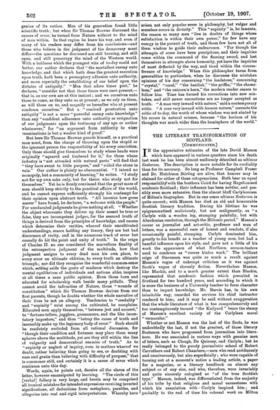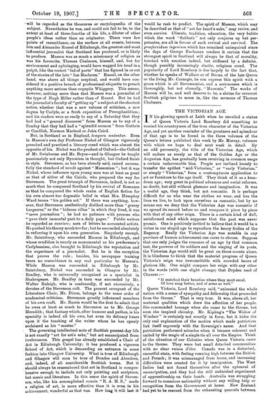THE LITERARY TRANSFORMATION OF SCOTLAND. [CommuNicATED.]
IN the appreciative estimates of the late David Masson which have appeared in various quarters since his death last week he has been almost uniformly d4soribed as u/timics &010MM. The description is more notable for its cordiality than for its accuracy. So long as Professor Campbell Fraser and Dr. Hutchison Stirling are alive, that honour may be claimed for either of these octogenarians. Both bear an equal responsibilitf with the brothers Caird for having Hegelianised academic Scotland ; their influence has been subtler, and pos- sibly even more extensive, than the almost bluff Carlyleanism of Milton's biographer. But in one sense ultimus Scotorum is quite correct; with Masson has died an old and honourable Scottish literary tradition. During his lifetime he was epig,rammatised maliciously, but not malignantly, as "a Carlyle with a wooden leg, stumping painfully, but with Aberdonian resolution, through the Miltonic period." Masson's career as journalist and art-critic, professor and man of letters, was a successful case of honest and resolute, if also occasionally painful, stumping. Carlyle dominated him, greatly to his benefit as a teacher of young men, but had a baneful influence upon his style, and gave not a little of his work the appearance of what Northern sermon-tasters used to condemn as "comae kintra wark." The brilliant reign of Stevenson was quite as much a revolt against Masson's vogue of unkempt criticism as it was against Scott's vogue of slovenly fiction. Nevertheless Masson, like Blackie, and to a much greater extent than Blackie, represented that academic fashion which prevailed in Scotland for two hundred years, and according to which it is more the business of a University teacher to form character than to impart knowledge. Mr. Barrie has, in his own inimitable way, recorded the services his chief instructor rendered to him; and it may be said without exaggeration that the whole literature of what is too comprehensively and too contemptuously termed "the Kailyard " bears the stamp of Masson's excellent variety of the Carlylean moral "vernacular."
Whether or not Masson was the last of the Scots, he was undoubtedly the last, if not the greatest, of those literary Scotsmen who have progressed from journalism into litera- ture. Ile was associated in various ways with genuine men of letters, such as Clough, De Quincey, and Carlyle; but he really belonged to the purely journalistic school of Robert Carruthers and Robert Chambers,—men who read assiduously and omnivorously, but also superficially ; who were capable of turning out at a moment's notice a leading article, a paper for a magazine, or a literary handbook on almost any subject or of any size, and who, therefore, were invariably and quite sincerely eulogised as "of the true Scottish type." Masson, indeed, was differentiated from the majority of his tribe by that religious and moral earnestness with which his association with Carlyle inspired him ; and probably to the end of time his colossal work on Milton
'will be regarded as the thesaurus or encyclopaedia of the • subject. Nevertheless he was, and could not fail to be, to the extent at least of three-fourths of his life, a diluter of other people's ideas rather than an originator. There were few • points of reSemblance, on the surface at all events, between him and Alexander Russel of Edinburgh, the greatest and most • influential journalist that Scotland has produced, or is likely • to produce. Masson was as much a missionary of religion as • was his favourite, Thomas Chalmers, himself, and, but for • environment and upbringing, would have wagged his head in a pulpit, like the veriest "lad of parts" that has figured in or out of the stories of the late " Ian Maclaren." Russel, on the other • hand, was above all things sceptical, and would have con- sidered it a positive breach of professional etiquette to preach anything more serious than eupeptic Whiggery. This means, however, nothing more than that Masson was a journalist of the type of Hugh Miller rather than of Russel. But he bad the journalist's fa:culty of "getting up" a subject at the shortest notice, whether that was a new volume of criticism, a new dogma by Carlyle, or a fresh exposition of Preraphaelitism; and his readers were as ready to say of a Saturday that they had had a`" graund discoorse" from Masson as to say of a Sunday that they had had a "splendid sermon" from Guthrie or Candlish, Norman Macleod or John Caird.
But, in Scotland as in England, tempora mutantur. Even in Masson's own day Professor Nichol of Glasgow vigorously preached and practised a literary creed which was almost the opposite of his. Nichol was the product of Oxford—the Oxford of Mr. Swinburne and Mr. Bryce—and-in Glasgow he taught passionately not only Byronism in thought,. but Oxford finish - in-style. Stevenson, as has been already said, raised success-
• fully the standard of revolt against " Massonism " ; but it was Nichol, whose influence upon young men was at least as great • as -that of either of the -Cairds, who prepared the way for
• Stevenson. The great triumph of Stevenson, indeed, is not so .muehithat he conquered Scotland by his revival of Romance -tte,that he conquered the-whole realm of- English fiction for • his -own almost too dogmatic belief in what Mrs. Humphry Ward terms "his golden art:" If there was anything, how- ' ever, that Stevenson aesthetically disliked more than "greasy burgesses," Or the "hideous villas" in which they lived, it was - "-mere journalism " ; he had no patience with persons who " gave their immortal part to-a daily paper." Public writers - he regarded as ouvriers ; men of letters he accounted artists. He pushed his theory much too far ; but he sueceeded absolutely in enforcing- it upon his own generation. Singularly enough, Mr. Saintsbury, who succeeded Masson. in Edinburgh, and whose ernditionla 'nearly as monumental as his predecessor's Carlylea.niam, also brought to Edinburgh the reputation and the experience of a journalist. But he is the exception that proves the rule ; besides, his newspaper training bears no resemblance in any real particular to Masson's. While Masson was succeeded in Edinburgh by Mr.
• Saintsbury, Nichol was succeeded in Glasgow by Mr.
• -• Bradley, who is universally recognised as a specialist in Shakespeare. Mr. Bradley in turn was succeeded by Mr. Walter Raleigh,- who is confessedly, if not excessively, a devotee of the Stevenson cult. The present occupant of the Literature Chair, Mr. Dixon, belongs to the same order of academical criticism. Stevenson greatly influenced members of his own craft. Mr. Barrie would be the first to admit that he owes at least as much to Stevenson- as to Mr. George Meredith ; that fantasy which, after humour and pathos, is his specialty is indeed all his own, but even its delicacy bears upon it the teaching of the writer whom he has openly _ acclaimed as his "master."
- The governing intellectual note of Scottish present-day life is not exactly "art for art's sake," but art emancipated from irrelevances.- This gospel-has already established a Chair of Art in Edinburgh University; it has produced a vigorous . School of Art, which is demanding as entrance in some fashion into Glasgow University. What is true of -Edinburgh and Mu** Will soon be true of Dundee and Aberdeen, 'and, - indeed, of- all considerable Scottish towns. But it - 'should always be remembered that art in Scotland is compre- hensive •enough to include not only painting and sculpture, but music and literature. In this sense the spirit of Steven- son, who, like his accomplished cousin "R. A. M. S.," made a religion of art, is more effective than it is even in his achievement, wonderful as that was. How long it will last it would be rash to predict. The spirit of Masson, which !APT be described as that of "art for heart's sake," may revive, and even survive. Climate, tradition, education, the very habits which the word "Sabbath" not only conjures up but per- petuates, are all in favour of such revival and survival. The praefervidum ingenium, which has remained unimpaired since the days of George Buchanan renders it certain that the strongest spirit in Scotland will always be that of morality, touched with emotion indeed, but stiffened by a definite, though possibly increasingly elastic, religious creed. The popularity of Lord Rosebery is due largely to the fact that, whether he speaks of Wallace or of Burns, of the late Queen or the living Mr. Carnegie, he can express this spirit with a grace which is all Stevensonian, and a seriousness which is thoroughly, but not clumsily, " Massonic." The werks of Aragson will be, and well deserve to be, a shrine for reverent Scottish pilgrims to muse in, like the sermons of Thomas Chalmers.











































 Previous page
Previous page